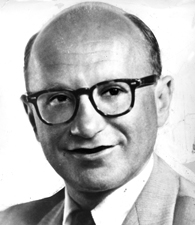Milton Friedman was inspired by the dire financial circumstances of the Great Depression, and became convinced that economic burdens could be lifted through encouraging free markets. His teaching at the University of Chicago created a new school of economic thought that continues to thrive.
Milton Friedman’s Early Days
Milton Friedman was born in New York City on July 31, 1912, to working-class Hungarian Jewish immigrants; he was the youngest of four children and the only boy.
Friedman’s parents kept a dry goods store in Rahway, New Jersey. Although they struggled financially and no member of the family had attended college before, they were determined to send their son to college. Friedman graduated from Rutgers University with a degree in math. He then received a full scholarship from the University of Chicago to study economics.
Friedman had wanted to keep studying math and could have accepted a math scholarship from Brown University. But he accepted the scholarship in economics from the University of Chicago instead.
“His choice was inspired by the ongoing Great Depression and his belief that economists could help solve it,” Brian Doherty wrote for Reason Magazine. “That decision guided the rest of Friedman’s career, as his reputation would be forever intertwined with the University of Chicago, the colleagues and students he met there, and the intellectual tradition its economics department came to represent.”
In 1937, Friedman joined the research staff of the National Bureau of Economic Research in New York City. Thanks to his steady salary, he was able to marry fellow economist Rose Director, whom he had met while studying in Chicago.
Sources in this Story
- Academy of Achievement: Milton Friedman, Ph.D.
- Reason Magazine: The Life and Times of Milton Friedman
- Library of Economics and Liberty: Concise Encyclopedia of Economics: Milton Friedman
- The Nobel Foundation: Economics 1976
- Bloomberg: Milton Friedman: Death of a Giant
Friedman’s Notable Accomplishments
Friedman received his Ph.D. from Columbia University in 1946. For his doctoral thesis, he used his essay “Income from Independent Professional Practice,” co-authored with Simon Kuznets, in which he argued that “licensing procedures limited entry into the medical profession, thereby allowing doctors to charge higher fees than they would be able to do if competition were more open,” the Concise Encyclopedia of Economics explains.
In 1951, he won the John Bates Clark medal, which honors economists younger than 40 for outstanding achievement, according to the CEE. Another essay, “A Theory of the Consumption Function” (1957), provided evidence against the Keynesian view of individual incomes, stating that instead of adjusting their expenditures in response to their current income, consumers’ annual consumption actually reflected their “permanent income,” or “a measure of the average income people expect over a few years,” the CEE reports.
In his 1962 book “Capitalism and Freedom,” Friedman argued in favor of the free market, using terms accessible to the lay reader. The book “Free to Choose,” co-authored with his wife, further outlined Friedman’s economic theories and was the best-selling nonfiction book in 1980.
In 1976, Friedman won the Nobel Prize for Economics. In the presentation speech, Erik Lundberg of the Royal Academy of Sciences declared, “Perhaps Friedman’s most characteristic feature is his unique propensity and ability to effectively influence and disturb current notions and previously established knowledge…Against a background of effective, often powerfully simplified, criticism of current doctrines, Friedman has presented a different point of view, an alternative theory, most often with the support of empirical analysis.”
The Man and His Work
- “Free to Choose: A Personal Statement”
- “Capitalism and Freedom”
- “Milton Friedman on Economics: Selected Papers”
- “Milton Friedman: A Biography,” by Larry Ebenstein
The Rest of the Story
Friedman died on November 16, 2006, at age 94. Keynesian economist Paul Samuelson said of his contemporary and rival, “Milton Friedman was a giant. No 20th-century economist had his importance in moving the American economic profession rightward from 1940 to the present.”
The Becker Friedman Institute for Research in Economics launched in July 2008 at the University of Chicago. According to its site, the institute “was established to preserve and foster the vibrant research environment that characterizes economics at the University of Chicago.”
The Friedman Foundation for Educational Choice is dedicated to preserving the educational theories of Milton and Rose Friedman, who argued in favor of school vouchers throughout their careers. Friedman and his wife established the organization in 1996. Today, the foundation “builds upon the Friedmans’ vision, clarifies its meaning to the public and amplifies the national call for true education reform through school choice.”
Interviews With Milton Friedman
- The Open Mind, 1975
- Academy of Achievement, January 31, 1991
- WGBH (PBS), October 1, 2000
- Reason Magazine, June 1995
This article was originally written by Isabel Cowles; it was updated June 29, 2017.











